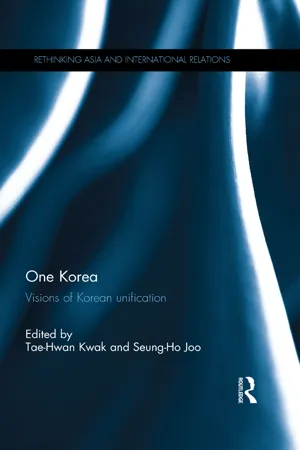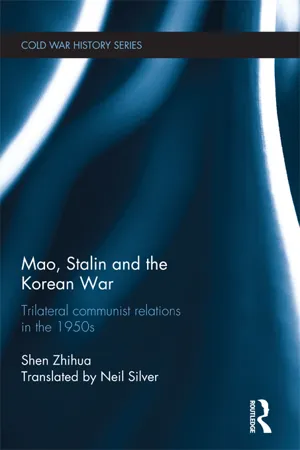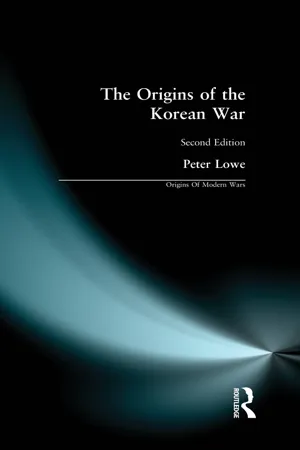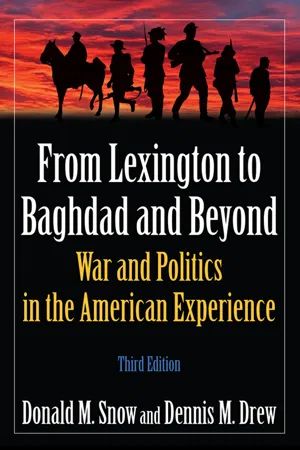China in the Korean War
China's involvement in the Korean War was a significant turning point in the conflict. After the North Korean invasion of South Korea, China intervened on the side of North Korea, leading to a prolonged and bloody conflict. China's entry into the war shifted the balance of power and ultimately contributed to the stalemate and division of Korea along the 38th parallel.
5 Key excerpts on "China in the Korean War"
- eBook - ePub
One Korea
Visions of Korean unification
- Tae-Hwan Kwak, Seung-Ho Joo, Tae-Hwan Kwak, Seung-Ho Joo(Authors)
- 2016(Publication Date)
- Routledge(Publisher)
...This is why the Ming dynasty used the Chinese army to help the Korean Lee dynasty to fight Japan in 1592, why the Qing government sent troops to the Korean peninsula to fight Japan in 1894, why Chiang Kai-shek supported the Republic of Korea’s independence movement, and it is also why the newly founded People’s Republic of China was involved in the Korean War in the 1950s. Due to geopolitical factors, these choices were almost inevitable. Just after World War II, the Cold War broke out, and the liberated Korean peninsula had also become divided into two parts that belonged to different blocs. In 1949, the newly founded China added itself to the socialist bloc led by the Soviet Union and adopted a “one-sided diplomacy policy.” When the Korean War broke out, China had no hesitation in involving itself in the war despite the number of difficulties it had to deal with at that time. Though many analysts thought that China was involved in the Korean War for ideological reasons, I have argued that the main reason for Chinese involvement was realist. China’s aim was to protect its own security, just as revealed by the slogan “resisting the United States’ aggression and aiding the DPRK, protecting our homes and defending our country.” As with all other countries, security was always the main concern of the new Chinese government, and the Korean War reflected the new Chinese government’s primary concern for security in the region. The word “security” is one of the most often used words in modern times. Security includes objective and subjective aspects: the objective aspect of security is a state where a people or country receive no threat from the outside world; the subjective aspect of security is where a people or country considers themselves safe. 1 There are some different methods to attaining security. A popular method is security cooperation...
- eBook - ePub
Mao, Stalin and the Korean War
Trilateral Communist Relations in the 1950s
- Shen Zhihua, Neil Silver(Authors)
- 2012(Publication Date)
- Routledge(Publisher)
...“It was not so much a local war as a localized general war.” 1 In its essence, the Korean War reflected the clash of the world’s two great camps, with newly allied China and the Soviet Union playing major roles in the war. China and the Soviet Union had their respective war goals, strategies and tactics. The cooperation and discord between the two affected the outcome of the war, greatly testing their alliance. Between the start of the war on June 25, 1950 and the entry of Chinese troops on October 25, 1950, the policies and tactics adopted by China and the Soviet Union toward the Korean War evolved along diametrically different lines: As North Korea’s war situation changed from good to bad, Soviet policy moved from close participation in planning and preparation for the initial military advance to studious avoidance of over-involvement as the situation spiraled downward, at one point approaching a Soviet decision to abandon North Korea. In contrast, Chinese policy and tactics transitioned from arguably rather peripheral attention to the conflict as it began to an active defensive strategy as the North began to collapse and China’s own border came under threat, with China in the end deciding to send troops to help North Korea under extremely unfavorable conditions. Soviet support for North Korea’s war plan By spring 1950, Soviet policy began to reflect a strategy of military confrontation with the United States, missing no opportunity to strengthen Soviet influence and control in Asia. However, the Soviet Union itself was not prepared for open conflict, and thus sought to avoid a direct military clash with the United States. Chinese policy, by contrast, was based on nurturing the nascent “New China,” but China did not hesitate to cross swords with the world’s greatest superpower when it felt driven into a corner...
- eBook - ePub
The Korean Peace Process and Civil Society
Towards Strategic Peacebuilding
- Dong Jin Kim(Author)
- 2018(Publication Date)
- Palgrave Macmillan(Publisher)
...In response, China dispatched the Chinese People’s Volunteers Force (CPVF) into the Korean peninsula by reason of assisting a fellow communist country. There have been several interpretations of the rationale for Chinese intervention in the Korean War. Xia says the general consensus among historians is that the US involvement in the Korean War and the deployment of the US Fleet to the Taiwan Strait provoked Chinese military response to safeguard the Chinese-Korean border and to prevent the escalation of US influence in East Asia. 42 Telegrams between Mao and Stalin show that the Soviets also provided covert assistance to North Korea, in the form of pilots, artillery personnel, and military goods. 43 Kathryn Weathersby says that the Soviet Union was careful not to be seen to be involved in the Korean War, to prevent the expansion of that war to a war with the US, but their role in providing arms and ammunition and keeping the route to the Korean peninsula open for Chinese troops and Soviet supplies was critical. 44 In the end, the Korean peninsula became an international battlefield. Stueck says, over half the military casualties were “non-Koreans, and a large portion of the casualties to Korean civilians would come at the hands of foreigners, particularly UN airmen bombing and strafing territory above the 38th parallel”. 45 When the Uniting for Peace resolution passed in November, MacArthur, as the Commander of the UN forces, ordered the destruction by air strikes of every installation, factory, city and village in North Korea...
- eBook - ePub
The Origins of the Korean War
Second Edition
- Peter Lowe(Author)
- 2014(Publication Date)
- Routledge(Publisher)
...This is profoundly ironic, given the course of events subsequently. Mao's attitude to the coming of the war in Korea was influenced heavily by the problem of Taiwan - another example of the fusing of the two crises in the summer of 1950. Mao chafed at his failure to conclude the last stage of the Chinese civil war on a note of resounding triumph with the liquidation of the Kuomintang. He was irate at the inability of the PRC's armed forces to capture islands off the Chinese coast in October-November 1949. 30 He was infuriated at the developing signs that the United States would frustrate a Chinese attempt to invade Taiwan. Mao was immensely proud, and justifiably so, of his great achievement in leading the CCP to victory. China was a great power in the making and could not acquiesce in American arrogance. Mao's relations with Stalin were tense and he disliked the fact that he was excluded effectively from the Soviet-North Korean planning. 31 Mao was compelled to bide his time. China did not play an important part in the approach of the Korean War but Mao's determination to assert Chinese power made it probable that China would intervene in Korea, if Kim Il Sung's confidence in attaining swift victory was not fulfilled. 29. Chen Jian, China's Road to the Korean War: The Making of the Sino-American Confrontation (New York, 1994), p. 112. 30. Ibid., pp. 89-90, 98-102. 31. Ibid., p. 134. Dulles visits South Korea Now to consider the political situation in South Korea in June and developments in American policy-making. Syngman Rhee's support had waned in 1949-50 following the President's increasingly autocratic behaviour, the effects of inflation, and the revelations of corruption and incompetence in the administration. Rhee experienced a setback in the general election held on 30 May with those supporting him suffering appreciable losses. 32 The most striking feature was the large increase in the number of independents...
- eBook - ePub
From Lexington to Baghdad and Beyond
War and Politics in the American Experience
- Donald M Snow, Dennis M. Drew(Authors)
- 2015(Publication Date)
- Routledge(Publisher)
...On the other hand, the North Koreans had total purposes in mind, but they lacked the manpower and physical resources to achieve those goals after the United States and other United Nations members entered the fray. Korea was also the first major military confrontation in the developing cold war competition between the Communist and non-Communist worlds. Certainly the two sides had confronted one another earlier, as in the Berlin blockade and airlift, but Korea was the first instance of actual, bloody conflict. It represented the first real test of the American policy of containment that had been articulated by the Truman administration during the second half of the 1940s. The Korean War was viewed initially as the first opportunity to confront and arrest the spread of communism beyond the Sino-Soviet periphery. In the light of the “fall” of China to Mao Tse-tung and the Communists in 1949 and a rising anticommunism in the United States that was moving toward the excesses of McCarthyism, the idea of stopping communism through the resort to force was initially quite popular, both within the United States and elsewhere in the non-Communist world. There would be no Munichs for the masters in the Kremlin. Korea was important because of its own geopolitical importance (especially in regard to Japanese security) and as a test of wills. For Americans the real enemy in Korea was not the North Koreans, even if it were they and the Chinese whom one was fighting. The real enemy was the Soviet Union, since Americans assumed that the North Koreans were acting as surrogates for the leaders in the Kremlin, who directed and orchestrated Communist activity everywhere as part of a closely coordinated international conspiracy. We may never know for sure exactly what the Soviet role in the North Korean attack was, although the gradual opening of Soviet archives by the Russian government has improved the chances...




